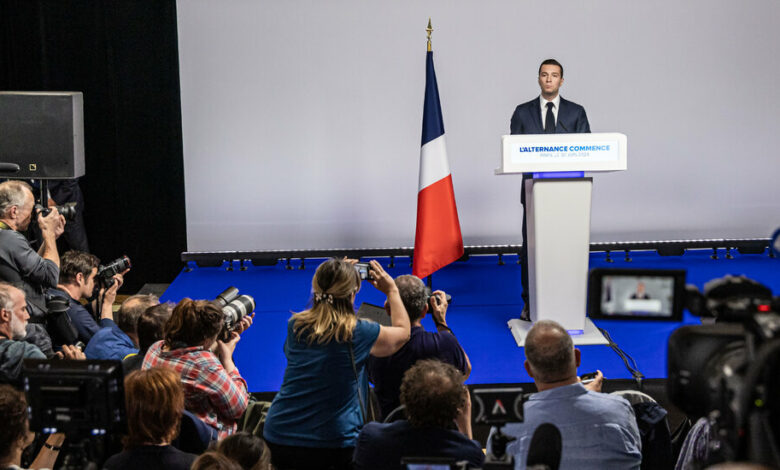What changes would a far-right government bring about in France?

Jordan Bardella, the leader of the far-right Rassemblement National who could become France’s next prime minister, has repeated the same basic promises since snap elections were called in France.
If his party forms the country’s government, he will significantly reduce immigration, cut taxes and tackle crime, he says.
But the Rassemblement National is the heir to a political tradition in France associated with overt racism, anti-Semitism and Holocaust denial. While the party has distanced itself from that past, some core philosophies are still embedded in its policies: immigrants are a threat to France’s security, economy and national identity.
Mr Bardella’s plans include abolishing the automatic right to French citizenship at 18 for children born in France to non-French parents; ending free medical treatment for undocumented immigrants except in emergencies; and restricting citizens with a second passport from taking jobs deemed sensitive, such as running a nuclear power plant and working in “strategic” defence.
He also wants to prevent convicted criminals from living in social housing and drastically reduce sales tax on all forms of energy, from fuel to electricity.
How he will do these things is not entirely clear. The party’s 21-page manifesto, replete with photos and graphics, is packed with far-reaching ideas but thin on details about how to implement them. And in the past three weeks of furious campaigning and debate, Mr. Bardella has walked back a number of promises or shelved them for later.
But even some of the measures consistently included in his plan – such as abolishing some automatic citizenship rights – and which he wants to implement immediately are likely to face opposition from President Emmanuel Macron and the country’s Constitutional Council.
And then there is the question of how Mr. Bardella would pay for all that.
“They will have difficulty implementing some parts of their programme,” said Rémi Lefebvre, a professor of political science at the University of Lille.
It is not even clear whether Mr. Bardella, 28, will become France’s next prime minister. His party and its allies won about 33 percent of the vote for the 577-seat National Assembly in the first of a two-round election on Sunday. But only 38 of their candidates won their seats outright.
Most of the remainder will face a decisive second vote next Sunday, and a national movement has sprung up across the country to prevent them from winning an outright majority. More than 200 of their challengers have withdrawn from the three-way race, giving extra votes to the strongest opponent to block them.
Mr Bardella has said he would not take up the post of prime minister without an absolute majority of 289 seats. But if he does become prime minister, he has promised his government will take a generous handful of measures this summer.
Some bills are in line with his party’s anti-immigration views, such as limiting the number of jobs for people with dual citizenship and abolishing free health care for undocumented immigrants.
Mr Bardella has promised to implement in the coming years the party’s long-cherished principle of “national preference” – giving French citizens preferential treatment over foreigners for certain government jobs, benefits or subsidies.
According to Anne-Charlène Bezzina, associate professor of public law and constitutional expert at the University of Rouen (Normandy), the measures are likely to be rejected by the country’s highest constitutional council.
Last spring, the Court ruled that no restrictions may be imposed on social security benefits for non-French citizens who have been resident in the country for less than five years. According to the Court, such restrictions would constitute a disproportionate infringement of the right to national solidarity enshrined in the French Constitution.
Awarding benefits by separating people based on birth or nationality goes against the fundamental concepts of the French Republic, which date back to the Age of Enlightenment and are enshrined in the Declaration of the Rights of Man and of the Citizen of 1789, Ms. Bezzina explained.
“You cannot distinguish between French people who are national or binational,” she said in an interview. “The same goes for distinguishing French people based on birthright or blood. It goes against the principle of equality.”
Experts say Mr. Bardella’s immediate plans to crack down on crime are likely to be implemented quickly and smoothly. In his first weeks in office, he has promised to pass laws setting minimum sentences for repeat offenders and cutting state subsidies for families of young offenders who reoffend.
“I think they can do that to please their voters,” said Mr. Lefebvre, a political science professor.
To put money back into French wallets, Mr. Bardella has promised, in particular, to significantly cut the country’s energy sales tax. When asked how he would pay for the measure — estimated at 17 billion euros (about $18.2 billion) by the Treasury Department — Mr. Bardella floated a number of options, including cutting France’s payments to the European Union by €2 billion.
There he will likely again come into conflict with Macron, a fervent supporter of the European Union, Lefebvre predicted.
But Mr. Bardella could also face a technical challenge. In the short term, if a French government simply refused to make the payment, it would likely be directly penalized and receive a proportional reduction in transfers from the European Union. Many of these go to French farmers, who are the biggest beneficiaries of agricultural subsidies, said Eulalia Rubio, a senior research fellow in European economic affairs at the Jacques Delors Institute in Paris.
Negotiations for the European Union’s next multiannual budget are set to begin next year. If the French government insists on a cut in its future payments, it will probably get something, she said, but not as much as two billion euros.
But the costs to the European Union, to which France is the second-largest contributor, will be large, said Ms. Rubio, who is also an associate senior research fellow at the Center for European Policy Studies.
“France has always been the country with a vision of a bigger budget for the European Union,” Ms. Rubio said. “You saw Macron asking for a doubling of EU spending. So we can forget about the big defense budget and the more economic support for Ukraine.”




